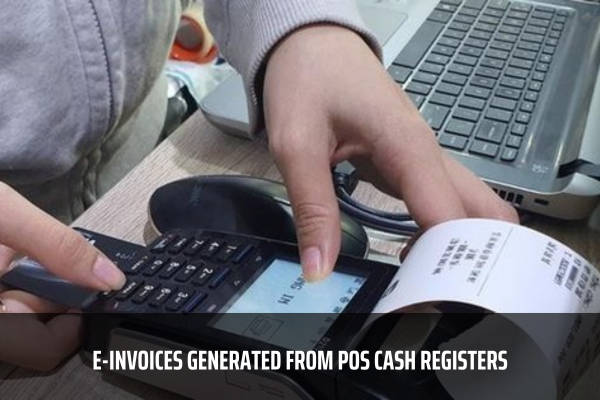What are the rules for the use of electronic invoices when the sellers use cash registers in Vietnam?
- Are invoices generated by cash registers that are digitally connected to tax authorities considered electronic invoices in Vietnam?
- What are the rules for the use of electronic invoices when the sellers use cash registers in Vietnam?
- What are the contents of an authenticated e-invoice generated from a POS cash register that is digitally connected to tax authorities in Vietnam?
Are invoices generated by cash registers that are digitally connected to tax authorities considered electronic invoices in Vietnam?
Pursuant to Article 89 of the Law on Tax Administration 2019, regulations on electronic invoices are as follows:
Electronic invoices
1. An electronic invoice means an invoice in the form of electronic data, issued by the goods seller or service provide to record the goods sale or service provision in accordance with regulations of law on electronic accounting and tax, including the invoices generated by cash registers that are digitally connected to tax authorities.
2. Electronic invoices include VAT invoices, sale invoices, electronic stamps, electronic tickets, electronic cards, electronic receipts, electronic delivery notes and other electronic documents.
3. Authenticated electronic invoices are electronic invoices that bear by tax authorities’ authentication codes before goods/services are sold to buyers.
The authentication code on an electronic invoice is a unique serial number generated by the tax authority’s system and a series of encoded characters based on information on the invoice.
4. Unauthenticated electronic invoices are electronic invoices that sent to buyers without tax authorities’ authentication codes.
5. The Government shall elaborate this Article.
Therefore, an authenticated/unauthenticated electronic invoice means an invoice in the form of electronic data, issued by the goods seller or service provide to record the goods sale or service provision in accordance with regulations of law on electronic accounting and tax, including the invoices generated by cash registers that are digitally connected to tax authorities
Thus, electronic invoices include the invoices generated by cash registers that are digitally connected to tax authorities.

What are the rules for the use of electronic invoices when the sellers use cash registers in Vietnam? (Image from the Internet)
What are the rules for the use of electronic invoices when the sellers use cash registers in Vietnam?
Pursuant to Article 90 of the Law on Tax Administration 2019:
Rules for issuance, management and use of electronic invoices
1. When selling goods/services, the seller shall issue and send electronic invoices to buyers. The electronic invoices shall follow standard formats and contain sufficient information in accordance with tax laws and accounting laws, regardless of the value of each sale.
2. The sellers that use cash registers shall register to use electronic invoices generated by cash registers that are digitally connected to the tax authorities.
3. The registration, management and use of electronic invoices in sale of goods/services shall comply with regulations of law on electronic transactions, accounting and tax.
4. Electronic invoices shall be authenticated by tax authorities according to information provided on the invoices by the enterprises, business organizations, other organizations, household businesses and individual businesses. Enterprises, business organizations, other organizations, household businesses and individual businesses are held responsible for the accuracy of information on their invoices.
5. The Government shall elaborate this Article.
Therefore, the sellers that use cash registers shall register to use electronic invoices generated by cash registers that are digitally connected to the tax authorities.
What are the contents of an authenticated e-invoice generated from a POS cash register that is digitally connected to tax authorities in Vietnam?
Pursuant to Article 8 of Circular 78/2021/TT-BTC:
Authenticated e-invoices generated from POS cash registers that are digitally connected to tax authorities
1. Authenticated e-invoices generated from POS cash registers that are digitally connected to tax authorities must comply with the rules laid down in Article 11 of Decree No. 123/2020/ND-CP.
2. When enterprises, household businesses or individual businesses that pay taxes according to tax declaration method provide goods or services directly to consumers according to such business models as shopping mall, supermarket, retailing of consumer goods, foods and drinks, restaurants, hotels, retailing of modern medicines, entertainment and relaxation services and other services), they may use either e-invoices generated from POS cash registers that are digitally connected to tax authorities or authenticated e-invoices or unauthenticated e-invoices.
3. An authenticated e-invoice generated from a POS cash register that is digitally connected to tax authorities shall have the following contents:
a) The seller’s name, address and TIN;
b) Information about the buyer, if requested (personal identification number of TIN);
c) Name of good/service, unit price, quantity and payment price. If an organization or enterprise pays taxes according to credit-invoice method, the selling price exclusive of VAT, VAT rate, total VAT payable, and total amount payable exclusive of VAT;
d) Issuance date of the invoice;
dd) Code of the tax authority.
...
An authenticated e-invoice generated from a POS cash register that is digitally connected to tax authorities shall have the following contents:
- The seller’s name, address and TIN;
- Information about the buyer, if requested (personal identification number of TIN);
- Name of good/service, unit price, quantity and payment price.
If an organization or enterprise pays taxes according to credit-invoice method, the selling price exclusive of VAT, VAT rate, total VAT payable, and total amount payable exclusive of VAT;
- Issuance date of the invoice;
- Code of the tax authority.
Thư Viện Pháp Luật